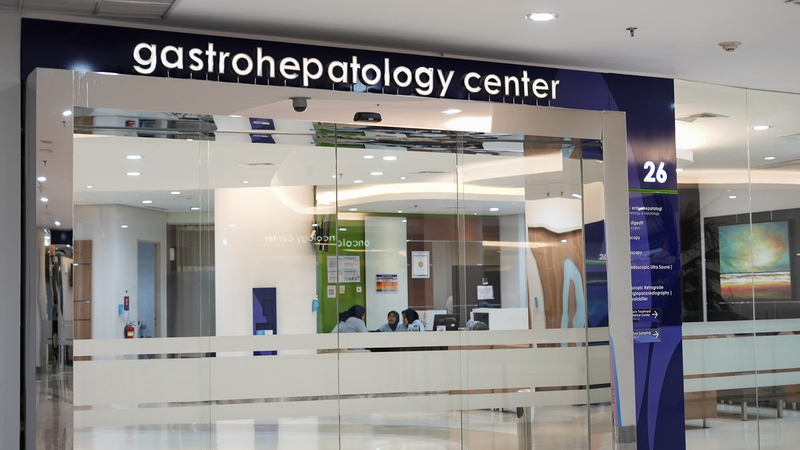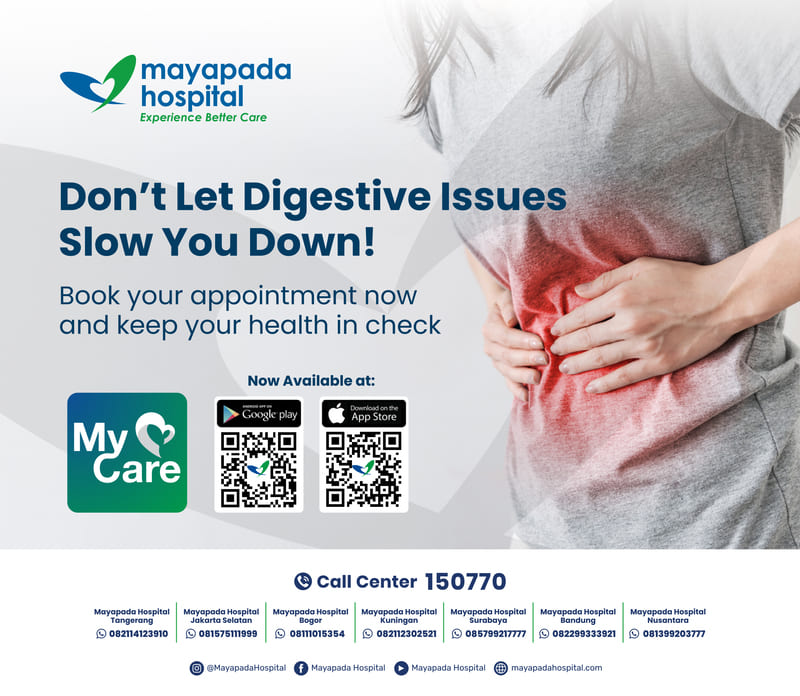Living in Indonesia provides the chance to indulge in the rich and flavourful Indonesian cuisine. However, it can also challenge your digestive health due to the prevalent use of strong spices, chillies, and coconut milk.
For expatriates who enjoy popular dishes like peanut-sauce-rich gado-gado and sate, spicy meals such as ayam geprek, or high-fat, coconut-milk-laden dishes like rendang, eating these foods can be pleasant but may also trigger digestive issues, such as diarrhoea or acid reflux (GERD).
A Closer Look at Potential Digestive Problems
Without realising it, consuming strongly spiced yet high-fat dishes can contribute to severe digestive problems, such as gallstones, also known as cholelithiasis. This condition can be asymptomatic but may cause sudden pain in the upper or mid-abdominal area when stones move within the gallbladder and block the bile duct. Other symptoms include nausea, vomiting, loss of appetite, dark urine, indigestion, and diarrhoea.
Dr Hendra Nurjadin, Sp.PD KGEH, a Gastrohepatologist at Mayapada Hospital Tangerang, explains: “Most gallstones form from hardened cholesterol deposits that turn into stones. These crystals can accumulate and vary in size, from a grain of sand to several centimetres.”
The risk of gallstones is higher among women over the age of 40, individuals with obesity, pregnant women, people undergoing hormone therapy, those with a family history of gallstones, and individuals with high-fat, high-cholesterol, and low-fibre diets.
“While gallstones are more common in individuals over 40 and those with a higher body mass, it is possible for anyone, even younger people, to develop them, particularly if they consume high-fat foods,” adds dr. Hendra.
This condition can be detected early for more effective and timely treatment. According to dr. Hendra, early detection of gallstones can be performed through an abdominal ultrasound or CT scan. If needed, an Endoscopic Ultrasound (EUS), Magnetic Resonance Cholangiopancreatography (MRCP), or ERCP (Endoscopic Retrograde Cholangiopancreatography) examination may also be recommended.
If gallstones are detected, treatment options include Laparoscopic Cholecystectomy. Dr. dr. Errawan Wiradisuria, Sp.B., Subsp.BD (K), M.Kes, a Digestive Surgeon at Mayapada Hospitals in South Jakarta and Kuningan, further explains:
“Laparoscopic Cholecystectomy is a minimally invasive procedure to remove the gallbladder. With technological advancements, this procedure can now be performed through a single incision (Single Incision Laparoscopy Surgery or SILS), allowing for faster recovery and no visible scarring on the abdomen,” dr. Errawan explains.
When Certain Foods Increase Your Obesity Risk
In addition to gallstones, the excessive consumption of high-carbohydrate and high-fat foods poses long-term health risks, increasing the likelihood of obesity—a condition of excessive fat accumulation that heightens the risk of heart disease, hypertension, and diabetes.
“A person is classified as obese if they have a body mass index (BMI) of 25kg/m2 or more,” says Dr Errawan. Obesity may also be caused by factors such as genetic disorders, certain medications, hormonal imbalances, ageing, pregnancy, and conditions like polycystic ovary syndrome (PCOS).
Initial treatment for obesity involves improving dietary habits to meet daily caloric needs and engaging in regular physical activity. If these measures are ineffective, doctors may recommend medication or surgical interventions.
One surgical option for obesity is bariatric surgery. “Bariatric surgery aims to address obesity and improve comorbid conditions by altering the digestive tract’s structure, which helps limit food intake and impacts appetite. Bariatric surgery is also minimally invasive, reducing risks and speeding up patient recovery,” dr. Errawan explains.
For bariatric surgery, further assessments are needed to determine eligibility. Dr. dr. Reno Rudiman MSc, Sp.B-SubSp BD (K), FICS, FCSI, a Digestive Surgeon at Mayapada Hospital Bandung, notes that bariatric surgery is generally recommended for people aged 15 to 70 who meet certain BMI criteria.
“Bariatric surgery is recommended for individuals with a BMI over 35. However, it can also be considered for those with a BMI of 30 who have comorbid conditions. For those with diabetes for over 10 years and unsuccessful medication treatment, bariatric surgery can even be considered at a BMI of 27.5,” dr. Reno explains.
The Right Way to Address Your Digestive Problems
Digestive problems can be challenging for expatriates regularly consuming flavourful local dishes, as these issues can disrupt productivity. Therefore, it is essential for expatriates to know about Indonesia’s top healthcare services for effective digestive healthcare.
Indonesia offers a range of internationally accredited private hospitals providing comprehensive digestive health services, with branches of Mayapada Hospital located across Jakarta (Lebak Bulus and Kuningan Rasuna Said), Tangerang, Bogor, Surabaya, Bandung, and the upcoming capital Nusantara. Mayapada Hospital’s Gastrohepatology Center is an ideal choice for expatriates seeking comprehensive digestive health screenings, diagnoses, and surgeries for both adults and children.
The Mayapada Hospital Gastrohepatology Center boasts a multidisciplinary medical team skilled in advanced procedures, including endoscopy, virtual colonoscopy, ERCP (Endoscopic Retrograde Cholangiopancreatography), minimally invasive surgery (laparoscopy) with traditional (three-incision) or single-incision (SILS) techniques. The centre also features English-speaking medical staff, ensuring seamless communication for expatriates throughout treatment.
Expatriates can conveniently access Mayapada Hospital’s Gastrohepatology Centre through the MyCare app, which allows patients to schedule check-ups, arrange in-person or virtual consultations (teleconsultation), and access up-to-date health information and services at Mayapada Hospital.
MAYAPADA HOSPITAL
- Instagram: @mayapadahospital
- Website: www.mayapadahospital.com
- Hotline: 150770
- Emergency Call: 150990




